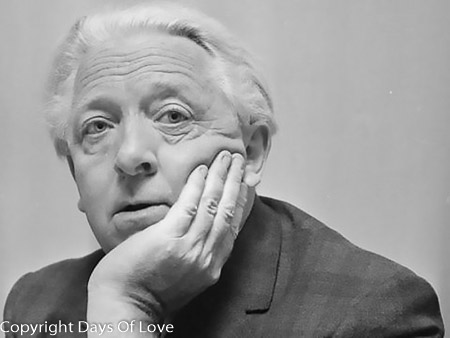Partner Tony Garrett
Queer Places:
Westminster School, Little Dean's Yard, Great Smith St, Westminster, London SW1P 3PF, Regno Unito
University of Oxford, Oxford, Oxfordshire OX1 3PA
The Mansion, Bletchley Park, Sherwood Dr, Bletchley, Milton Keynes MK3 6EB, Regno Unito
502 Dolphin Square East Side, Pimlico, London SW1V, Regno Unito
West Suffolk Crematorium, Risby, Bury Saint Edmunds IP28 6RR, Regno Unito
 Sir
Angus Frank Johnstone-Wilson, CBE (11 August 1913 – 31 May 1991) was an
English novelist and short story writer. He was awarded the 1958 James Tait
Black Memorial Prize for The Middle Age of Mrs Eliot and later received
a knighthood for his services to literature.[3]
Sir
Angus Frank Johnstone-Wilson, CBE (11 August 1913 – 31 May 1991) was an
English novelist and short story writer. He was awarded the 1958 James Tait
Black Memorial Prize for The Middle Age of Mrs Eliot and later received
a knighthood for his services to literature.[3]
Wilson was born in Bexhill, Sussex, England, to an English father, William
Johnstone-Wilson, and South African mother, Maude (née Caney), of a wealthy
merchant family of Durban.[4][5][6]
Wilson's grandfather had served in a prestigious Scottish army regiment, and
owned an estate in Dumfriesshire, where William Johnstone-Wilson (despite
being born at Haymarket) was raised, and where he subsequently lived.[7][8]
Wilson was educated at Westminster School and Merton College, Oxford,[9]
and in 1937 became a librarian in the British Museum's Department of Printed
Books, working on the new General Catalogue. Previous employment included
tutoring, catering, and co-managing a restaurant with his brother.[10]
During World War II, he worked in the Naval section at the code-breaking
establishment, Bletchley Park, translating Italian Naval codes. A wearer of
large, brightly coloured bow-ties, he was one of the "famous homosexuals" at
Bletchley. The work situation was stressful and led to a nervous breakdown,
for which he was treated by Rolf-Werner Kosterlitz. A Wren, Dorothy Robertson,
was taught traffic analysis by him and another instructor. She recalled him
as:
[11]
- a brilliant young homosexual .... He used to mince into the room
wearing, in those days, outrageous clothes in all colours; he
chain-smoked; his nails were bitten down to the quick and he had a rather
hysterical laugh.
He returned to the Museum after the end of the War, and it was there that
he met Tony Garrett (born 1929), who was to
be his companion for the rest of his life.
Wilson's first publication was a collection of short stories, The Wrong
Set (1949), followed quickly by the daring novel Hemlock and After,
which was a great success, prompting invitations to lecture in Europe.[12]
In 1953 Wilson shared an apartment with Dutch writer
Gerard Reve.
Wilson worked as a reviewer, and in 1955 he resigned from the British Museum to
write full-time (although his financial situation did not justify doing so)
and moved to Suffolk.
He was instrumental in getting Colin Wilson's first novel published in 1956[13]
and from 1957 he gave lectures further afield, in Japan, Switzerland,
Australia, and the USA. He was appointed a Commander of the Order of the
British Empire (CBE) in 1968, and received many literary honours in succeeding
years. He was knighted in 1980, and was President of the Royal Society of
Literature from 1982 to 1988. His remaining years were affected by ill health,
and he died of a stroke at a nursing home in Bury St Edmunds, Suffolk, on 31
May 1991, aged 77.[2]
His writing, which has a strongly satirical vein, expresses his concern
with preserving a liberal humanistic outlook in the face of fashionable
doctrinaire temptations. Several of his works were adapted for television. He
was Professor of English Literature at the University of East Anglia from 1966
to 1978,[6]
and jointly helped to establish their creative writing course at masters level
in 1970,[14]
which was then a groundbreaking initiative in the United Kingdom.
My published books:


BACK TO HOME PAGE

- https://en.wikipedia.org/wiki/Angus_Wilson
- Woods, Gregory. Homintern . Yale University Press. Edizione del
Kindle.
 Sir
Angus Frank Johnstone-Wilson, CBE (11 August 1913 – 31 May 1991) was an
English novelist and short story writer. He was awarded the 1958 James Tait
Black Memorial Prize for The Middle Age of Mrs Eliot and later received
a knighthood for his services to literature.[3]
Sir
Angus Frank Johnstone-Wilson, CBE (11 August 1913 – 31 May 1991) was an
English novelist and short story writer. He was awarded the 1958 James Tait
Black Memorial Prize for The Middle Age of Mrs Eliot and later received
a knighthood for his services to literature.[3]
